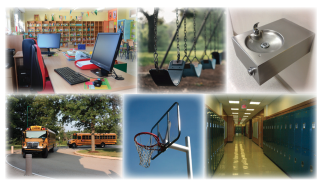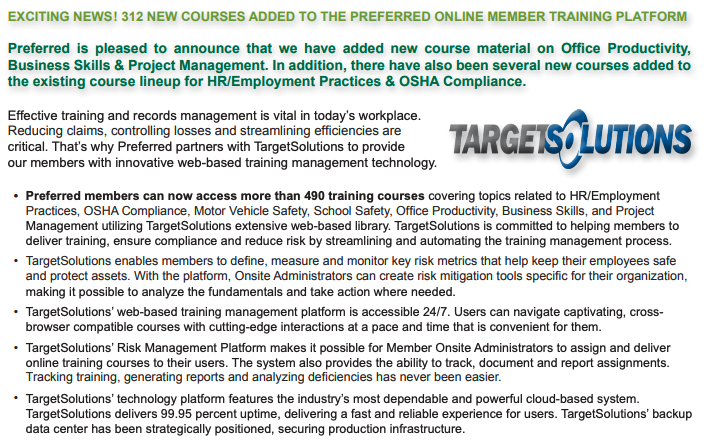By Chris Kittleson, Sr. Safety & Risk Management Consultant - Public Risk Underwriters of Florida, Inc.

Charter schools have been an emerging entity that has been on the increase over the past decades as School Districts evaluate innovative methods to improve student performance and educational outcomes. Although charter schools have been created and accepted as a viable option to meet the demand for excellence in K-12 public school systems, they pose unique challenges and risks for the Charter School Operator. More specifically, as school districts assist in the creation of charter schools, many aging facilities are identified as possible locations for these schools posing a unique challenge for the Charter School Operator.
Also, it should be noted that charter school funding resources are limited to similar budgetary constraints as typical public schools. This means they may inhabit facilities that require additional resources to correct a variety of physical hazards that represent moderate to severe risk and may not, in some cases, meet local building codes requirements as well as Americans with Disability Act (ADA) standards. Examples of this include abandoned retail establishments, libraries, warehouses as well as former school locations.
The type of physical hazards that Charter School Operators may have to address include the following:
• Damaged walking/working surfaces
• Unsafe playground equipment
• Improperly maintained landscaping
• Inadequate interior/exterior lighting
• Improperly maintained/inadequate fencing
• Damaged temporary structures
• Unsafe electrical fixtures/wiring
• Uninspected/maintained fire suppression/alarm systems
• Uninspected/maintained security systems
• Unsanitary kitchen facilities
• Inadequate plumbing systems
• Non-compliant pool & spa facilities
In addition to physical hazards there are other risks and exposures that should be considered by the Charter School Operator as follows:
• Student transportation
• School sponsored field trips/summer camps
• Liability exposure created by Third Party Use
• Student interaction/bullying prevention
• Emergency preparedness and response
• Visitor identification and control
• Workplace violence, i.e. Active Shooter
• Student/Teacher interaction, i.e. Child & Youth Protection Policy
The solution to reducing and eliminating charter school safety and security challenges resides in a progressive self assessment in order to maintain compliance with the applicable school district, OSHA, Building Code and Department of Health regulations. In order to accomplish mandates, the Charter School Operator should provide for a school safety self assessment, conduct regular and reoccurring inspections to identify unsafe conditions/behavior as well as provide safety training for new/existing Staff and Volunteers.
In an effort to assist Charter School Operators, The Florida Department of Education has implemented the Florida Safe Schools Assessment Tool (FSSAT) to more effectively manage safety assessments.
The assessment measures school and district practices in seven general categories as follows:
• Efficiency and Effectiveness
• Health and Safety Planning
• Discipline Policies and the Code of Conduct
• School Climate
• Safety Programs
• Facilities and Equipment
• Transportation

FSSAT will also be used by schools to store emergency plans, blueprints, contact details and photos in a repository to give emergency responders efficient access to that information during an incident. Access to the system will be given to authorized users from the Department of Education and other agencies as well as district personnel via a secure online portal located at – http://www.fldoeschoolsafety.org/
Additional resources are available for Members of Preferred that include complementary inspection and training resources available from our Loss Control Department. Examples of this would include a Preferred School Facility Inspection Form as well as Preferred’s Target Solution on-line training platform that has a complement of school safety training listed in the School District Section of the course catalog along with a full complement of other safety related courses that can be used to provide additional safety training.
In summary, as a Member of Preferred we have the resources to assist our Charter School Members with their Loss Control needs. For further information and assistance please contact your assigned Preferred Loss Control Consultant at our website located at – www.pgit.org.
Christopher H. Kittleson joined Public Risk Underwriters of Florida, Inc. as a Sr. Risk Control Consultant in 2010 and provides Loss Control services for the southern Florida region. With over 19 years of safety & health consulting experience Chris has developed industry expertise in the areas of Construction, Manufacturing and USL&H as well as safety programming expertise in the areas of Safety Program Development, Return to Work Programs, Regulatory Compliance, Accident Investigation and Safety Training. Prior to working in the Insurance industry Chris’ career was with IBM where he held various Engineering positions. Chris graduated Cum Laude from St. Cloud State University, St. Cloud, MN with a Bachelors of Science in Engineering Technology, has earned his Associate in Risk Management (ARM) designation, is a Professional Member of the American Society of Safety Engineers (ASSE) and was awarded the 2014 Safety Professional of the Year Award by the South Florida Chapter of ASSE.

If you would like further details on this valuable resource, please contact Michael Stephens, Senior Loss Control Specialist at email: [email protected] or phone: (321) 832-1658.
